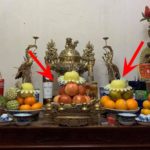When cleaning the ancestral altar and joss sticks, it is essential to include an invocation. Learn with us why an invocation is necessary and how to perform this ritual properly through the following article.
1 Why Do We Need an Invocation When Cleaning the Ancestral Altar and Joss Sticks?
The ancestral altar is a sacred place. Therefore, if you wish to clean it, move objects, or conduct a ritual called “bao sai ban tho” (a Vietnamese tradition of cleaning and rearranging the altar), you must first perform an invocation to ask for permission from the deities. Omitting this step and proceeding with cleaning or touching the altar without permission is considered disrespectful and may disturb the peace of the deities.
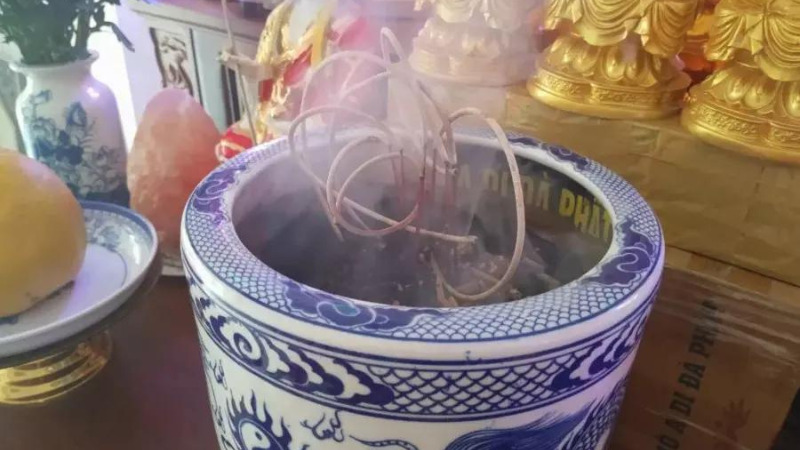 An illustration of an ancestral altar with joss sticks and offerings. The text describes the need for an invocation before cleaning the altar.
An illustration of an ancestral altar with joss sticks and offerings. The text describes the need for an invocation before cleaning the altar.
2 How to Prepare the Ritual and Offerings
Before performing the “bao sai ban tho” ritual, you must prepare the following offerings:
-
1 plate
-
1 piece of betel leaf
-
1 plate of seasonal fruit
-
1 teapot with a set of 5 small cups
-
3 small bowls
-
1 cup of cooled boiled water
-
3 gold-printed votive papers
-
2 flower vases
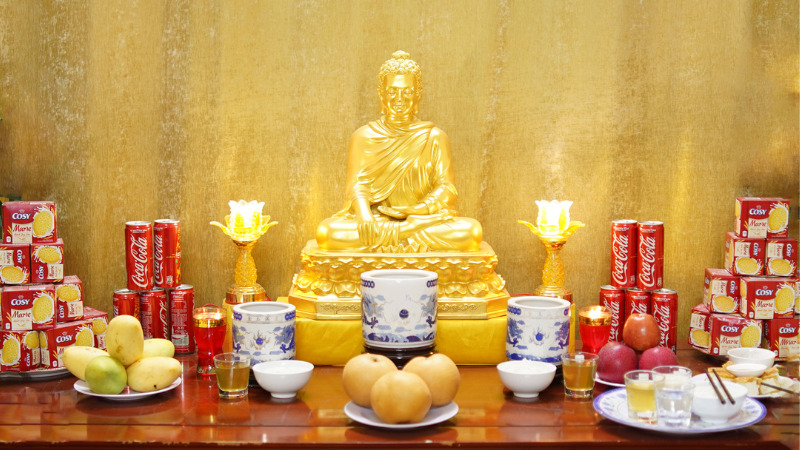 An image showcasing the ritual items and offerings for the “bao sai ban tho” ceremony.
An image showcasing the ritual items and offerings for the “bao sai ban tho” ceremony.
3 Invocation Before Removing the Joss Sticks
Nam Mo A Di Da Phat (recited 3 times)
My name is [your name].
I reside at [your address].
Today, on the [date], I humbly admit that I have not been diligent in keeping the ancestral altar clean and tidy. I realize that the altar has accumulated some dust and requires purification.
I sincerely ask for permission from the deities [specify the deities or ancestors worshipped on your altar] to perform the “bao sai ban tho” ritual today, on this auspicious day and time. I seek your blessing to clean and purify the altar, ensuring its sanctity and tranquility. I humbly request your presence and protection during this process.
I respectfully ask that you temporarily withdraw from this place while I perform the cleaning. I pray that you will grant me the strength to carry out this task with precision and beauty. May the altar be restored to its proper position, and may the spirits of our ancestors find peace. May our home be blessed with harmony and prosperity. May the offerings on the altar remain undisturbed, and may our wealth and luck be preserved.
I am but a humble human, flawed and sinful. I offer my sincere apologies for any mistakes or oversights. May you find it in your hearts to forgive me.
Nam Mo A Di Da Phat (recited 3 times).
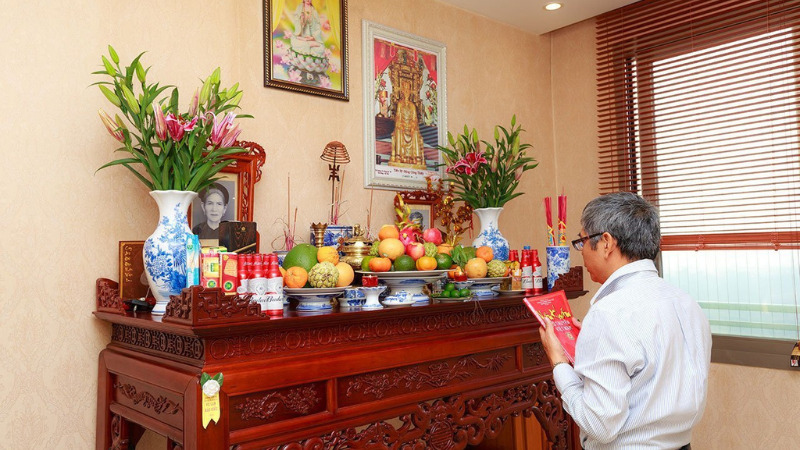 An image of joss sticks with the text describing the invocation to be recited before removing the joss sticks.
An image of joss sticks with the text describing the invocation to be recited before removing the joss sticks.
4 Invocation for Cleaning the Ancestral Altar
Nam Mo A Di Da Phat! (recited 3 times)
My name is: [your name].
I reside at: [your address].
Today, on the [date], I realize that I have neglected the cleanliness of the ancestral altar, and for that, I sincerely apologize.
I humbly ask for permission from the deities [specify the deities or ancestors worshipped on your altar] to perform the “bao sai ban tho” ritual today, on this auspicious day. I seek your blessing to clean and purify the altar, making it dignified and serene. I respectfully request your presence and protection during this process.
I pray that you will guide me in performing this task with diligence and beauty. May the altar be restored to its proper position, and may our ancestors’ spirits find peace. May our home be blessed with harmony, and may our residence be prosperous.
I am but a humble human, flawed and sinful. If I have made any mistakes or offended you in any way, I ask for your forgiveness and mercy.
(Bow 3 times).
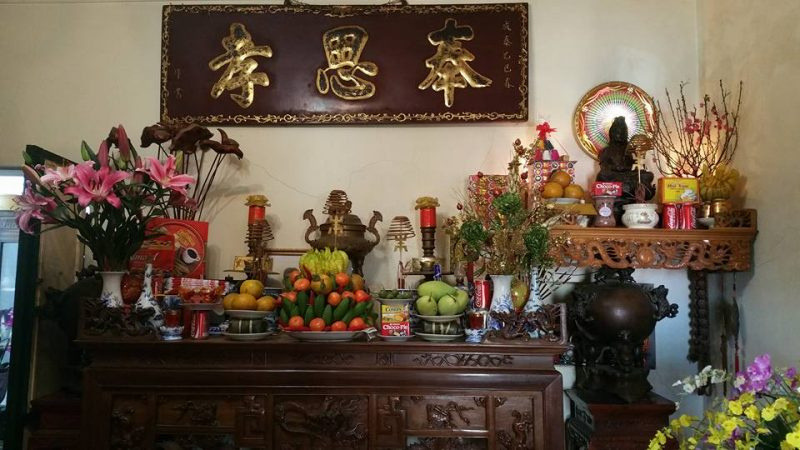 An image of an ancestral altar with the text describing the invocation for cleaning the altar.
An image of an ancestral altar with the text describing the invocation for cleaning the altar.
5 Invocation for Cleaning the Joss Sticks and Trimming the Incense Sticks
Nam Mo A Di Da Phat! (recited 3 times)
I bow to the Nine Directions of Heaven and the Ten Directions of the Buddha.
I respectfully bow to the Jade Emperor, the Supreme Ruler of Heaven and Earth, and the Five Directions, Five Types of Soil, and the Dragon Vein Gods, including the Eastern Kitchen God, the Life-Governing God, and the Stove God.
My name is: [your name].
I reside at: [your address].
I respectfully bow to the Gods of Wealth and the Earth, who govern this place: [address of the altar or home].
Today, on the [date], I seek your permission to clean and rearrange the ancestral altar and your revered places. May you grant me this favor so that I may perform this task with purity and devotion.
Nam Mo A Di Da Phat! (recited 3 times)
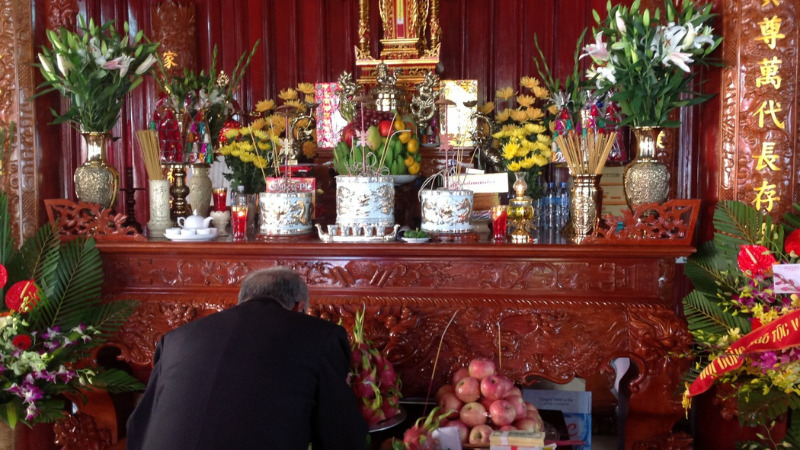 An image of joss sticks with the text describing the invocation for cleaning the joss sticks and trimming the incense sticks.
An image of joss sticks with the text describing the invocation for cleaning the joss sticks and trimming the incense sticks.
6 Invocation After Cleaning the Ancestral Altar
Nam Mo A Di Da Phat! (recited 3 times)
I bow to the Nine Directions of Heaven.
I bow to the Ten Directions of the Earth.
I respectfully bow to the Ten Directions of the Buddha.
I bow to the deities in charge of this year and this region, as well as the deities of the military and the divine soldiers.
I bow to the Five Directions, the Five Types of Soil, the Gods of Wealth, and the Stove God.
My name is: [your name].
I reside at: [your address].
Today, on this auspicious day, I have chosen the perfect time to purify and clean the ancestral altar.
Now that the tasks of the living have been fulfilled, I invite all the deities and spirits to return to their places on the altar so that I may continue to worship and make offerings to you.
I express my gratitude for the blessings of the past year and humbly ask for new blessings in the coming year.
May you grant me your blessings and protection, ensuring peace and prosperity for my family. May we be safe in our travels and endeavors. May good fortune find us, and may negative influences be taken away.
I offer my sincere heart and these humble offerings. If I have made any mistakes or offended you in any way, I ask for your forgiveness and mercy.
May the deities and spirits hear my sincere plea.
Nam Mo A Di Da Phat! (recited 3 times)
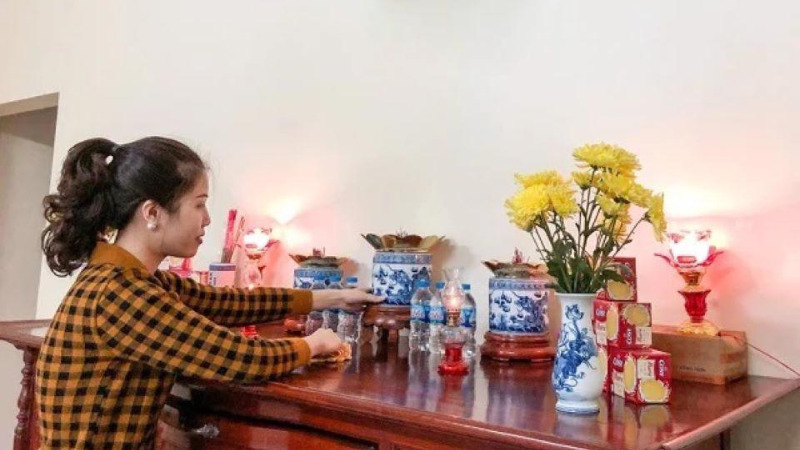 An image of an ancestral altar with the text describing the invocation to be recited after cleaning the altar.
An image of an ancestral altar with the text describing the invocation to be recited after cleaning the altar.
7 Invocation for Trimming the Incense Sticks on the God of Wealth’s Altar
Nam Mo A Di Da Phat! (recited 3 times)
I bow to the Nine Directions of Heaven and the Ten Directions of the Buddha.
I respectfully bow to the Jade Emperor, the Supreme Ruler of Heaven and Earth, and the Five Directions, Five Types of Soil, and the Dragon Vein Gods, including the Eastern Kitchen God, the Life-Governing God, and the Stove God.
My name is: [your name].
I reside at: [your address].
I respectfully bow to the spirits of our ancestors, the Nine Generations of Patriarchs and Matriarchs, the female ancestors, the child spirits, and the boy and girl spirits of our family line [add your family name].
Today, on the [date, usually towards the end of the year], I seek your permission to clean and rearrange the ancestral altar to bid farewell to the old year and welcome the new one [or specify the reason for cleaning, such as maintaining the altar’s cleanliness and dignity]. May you grant me this favor so that I may perform this task with purity and devotion.
Nam Mo A Di Da Phat! (recited 3 times)
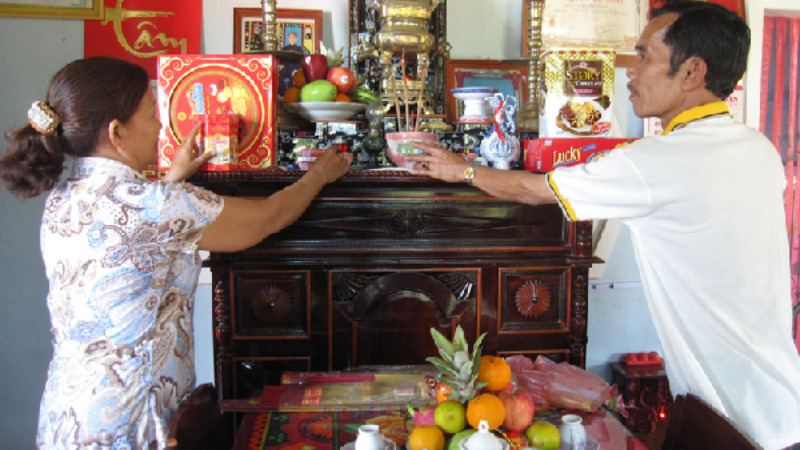 An image of an altar with the text describing the invocation for trimming the incense sticks on the God of Wealth’s altar.
An image of an altar with the text describing the invocation for trimming the incense sticks on the God of Wealth’s altar.
8 Guide to Properly Removing the Joss Sticks
The person responsible for removing the joss sticks should be well-groomed, clean, and respectful. They should recite the invocation and offer incense to seek permission before proceeding.
After seeking permission, the head of the household can begin removing the joss sticks one by one, leaving behind only a few of the most beautiful ones (in odd numbers: 3, 5, 7, or 9).
The removed joss sticks should be burned, and the ashes can be scattered in a river or buried at the foot of a tree.
During the process, ensure that the incense burner remains stable and is not moved or disturbed. Once the task is completed, it is essential to offer incense again and respectfully inform the ancestors or deities.
For further guidance:
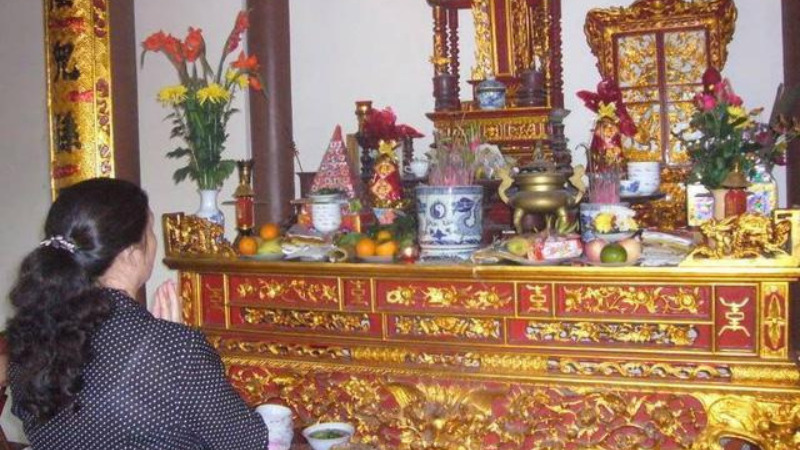 An image illustrating the proper way to remove joss sticks with the text providing additional guidance.
An image illustrating the proper way to remove joss sticks with the text providing additional guidance.
9 Important Notes When Cleaning the Joss Sticks and Trimming the Incense Sticks
-
Choose an auspicious day and time for cleaning the joss sticks: the 24th day of the twelfth lunar month (during the hours of the Dragon, Snake, or Horse), the 28th day (during the hours of the Rabbit, Snake, or Monkey), or the 29th day (during the hours of the Dragon, Snake, or Horse)
-
The person performing the cleaning ritual should be well-dressed and clean.
-
Perform the cleaning and trimming gently and carefully to avoid breaking or damaging the offerings.
-
Do not clean the ancestral altar before cleaning the deities’ altar.
-
Use warm, clean water for cleaning.
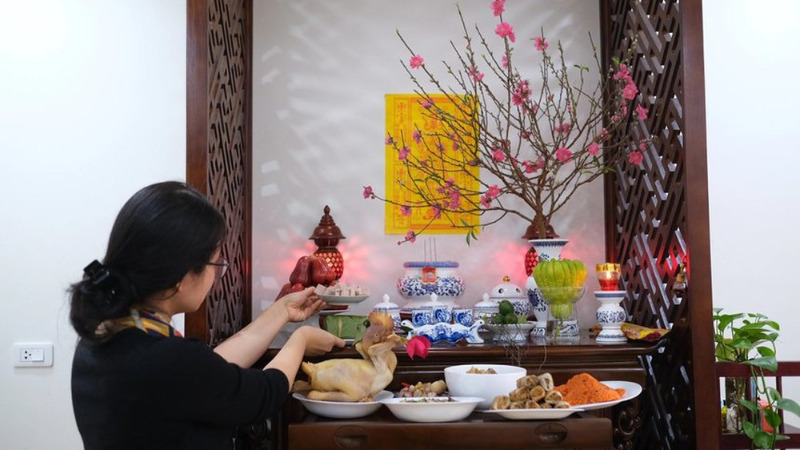 An image of joss sticks and incense sticks with the text providing important notes for the cleaning ritual.
An image of joss sticks and incense sticks with the text providing important notes for the cleaning ritual.
The above invocations and guidelines for cleaning the ancestral altar and joss sticks are gathered from various sources. We hope that this article has provided you with valuable information.
Tips for Celebrating the Mid-Autumn Festival
As families come together under the light of the full moon to celebrate the Mid-Autumn Festival, it’s important to be aware of the ways to ensure good luck during the reunion holiday. This article will explore the dos and don’ts that will bring you and your family prosperity and health during the occasion.



























